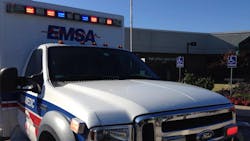OK Ambulance Service Seeks Help amid Staff Shortage
Citing a severe staffing shortage amid a surge in COVID-19 cases and the typical increase in service calls during summer, the Emergency Medical Services Authority announced Monday that Oklahoma City Fire Department medics will be authorized temporarily to transport patients suffering heart attacks and other related symptoms.
"We obviously are going to prioritize the life and death cases," EMSA Medical Director Jeffrey Goodloe said. "We want to get that fire crew back in service as soon as possible so they can be available for the next call, because we never know when the next call to 9-1-1 is going to be."
Under the authorization, when a fire department medic diagnoses a patient with acute coronary syndrome and an EMSA unit has not been assigned, the medic must call an EMSA supervisor to determine if a unit will arrive within 20 minutes.
If an EMSA unit cannot be guaranteed to arrive in 20 minutes, the medic must call the Office of the Medical Director and give a complete patient report. The Office of the Medical Director will determine if a fire department vehicle can transport the patient and to which hospital.
During a news conference at the downtown fire station, emergency response authorities said Oklahoma City is among cities around the nation enduring a shortage of qualified emergency medical technicians and paramedics who provide pre-hospital treatment, care and transportation.
Goodloe said the emergency response system here is under stress as the COVID-19 pandemic has intensified at a time when paramedics are responding to increased summer calls related to car accidents, boating and water emergencies, and the regular load of heat strokes and chronic illnesses.
"When we look at the confluence of a busy summer in Oklahoma City, we are in the midst of not just a pandemic, but by all scientific evidence, the fourth wave of this pandemic in the United States," Goodloe said. "And the fact that EMS is a tough career and frankly it is hard to recruit qualified EMTs and paramedics to this profession when you look at those things together, our EMS system today is under significant demand."
EMSA President and CEO Jim Winham said the ambulance service typically administers 1,500 tests annually to potential paramedics and EMTs. That number fell to about 250 last year, and some schools are shutting down because there are not enough students, he said.
A rookie who has graduated the 14-month paramedic program makes around $55,000 a year, Winham said. With the shortage of paramedics, EMSA is offering a $20,000 sign-on bonus and is considering paying off student loans, covering relocation expenses and even providing the cost of daycare, he said.
EMSA's Western Division has 31 open positions for full-time paramedics and nine openings for full-time EMTs.
"Everything is predicated on the staffing," Winham said.
At the same time, hospitals are filling up with COVID-19 patients, which is causing a delay for emergency responders who have transported their patients and are waiting for a bed.
Some bed delays can last an hour or longer, authorities said. But as emergency responders wait at the hospital, another 911 call might come in.
Winham said EMSA usually conducts 300 responses a day, with about 275 turning into transports to area hospitals. That number has jumped to 400 responses a day, with more than 300 transports, he said.
While EMSA historically handles between 75 and 80 priority-one calls each day, Winham said that number nearly doubled on June 27, to 158.
Meanwhile, response times for Oklahoma's largest ambulatory care provider have not met compliance standards in more than a year for the Oklahoma City area, which includes Edmond, Mustang, The Village and Nichols Hills.
Indeed, EMSA's Western Division has not met the 90% compliance standard for response times since before June 2020, according to recent data. During that time, EMSA assumed control of staffing and operations from its former contractor, American Medical Response.
For its highest priority calls, which mostly include life-threatening events, the division fell to its lowest rating of 63% in December 2020, the first month EMSA held full control.
While numbers improved slightly from January to May, they fell again in June, having never fully rebounded.
"I am not happy with what's going on," Winham said Monday. "None of our folks is happy with what's going on. We are going to do everything we can to fix it."
Fire department officials said as of May, there are advanced life support paramedics at every station ready to respond to medical emergencies. About 37 Oklahoma City firefighters are cleared to volunteer as transport medics, officials said.
In another measure to alleviate the overburdened emergency response system and free up EMSA to respond to more calls, fire personnel have cleared roughly 1,000 "patient refusals," or cases when patients do not want to be taken to a hospital.
Fire officials said administering patient refusals usually falls on the shoulders of EMSA paramedics.
"It is a nationwide event that we're seeing in the challenges that we have," Oklahoma City Fire Chief Richard Kelley said.
___
(c)2021 The Oklahoman
Visit The Oklahoman at www.newsok.com
Distributed by Tribune Content Agency, LLC.
